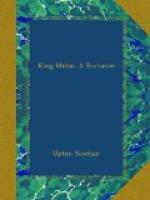The dinner was over soon after that, and she looked out again, just as the first drops of rain were falling; the thunder was rolling louder, bringing to Helen a faint echo of her morning music. She went in and sat down at the piano, her fingers roaming over the keys hesitatingly. “I wish I could get it again,” she mused. “It seems like a dream when I think of it, it was so wild and so wonderful. Oh, if I could only remember that march!”
There came a crash of thunder near by, as if to help her, but Helen found that all efforts were in vain. Neither the storm music nor the march came back to her, and even when she played a few chords of the great chorus she had sung, it sounded tame and commonplace. Helen knew that the glory of that morning was gone where goes the best inspiration of all humanity, back into nothingness and night.
“It was a shame,” she thought, as she rose discontentedly from the piano. “I never was so carried away by music in my life, and the memory of it would have kept me happy for weeks, if Arthur hadn’t been here to trouble me!”
Then, however, as she went to the window again to watch the storm which was now raging in all its majesty, she added more unselfishly: “Poor boy! It is dreadful to think of him being out in it.” She saw a bolt of lightning strike in the distance, and she waited breathlessly for the thunder. It was a fearful crash, and it made her blood run faster, and her eyes sparkle. “My!” she exclaimed. “But it’s fine!” And then she added with a laugh, “He can correct his poem by it, if he wants to!”
She turned to go upstairs. On the way she stopped with a rather conscience-stricken look, and said to herself, “Poor fellow! It seems a shame to be happy!” She stood for a moment thinking, but then she added, “Yet I declare, I don’t know what to do for him; it surely isn’t my fault if I am not in love with him in that mad fashion, and I don’t see why I should make myself wretched about it!” Having thus silenced her conscience, she went up to unpack her trunks, humming to herself on the way:
“Sir Knight, a faithful sister’s
love
This heart devotes to thee;
I pray thee ask no other love,
For pain that causes me.
“Quiet would I see thee come,
And quiet see thee go;
The silent weeping of thine eyes
I cannot bear to know.”
While she was singing Arthur was in the midst of the tempest, staggering towards his home ten miles away. He was drenched by the cold rain, and shivering and almost fainting from exhaustion—for he had eaten nothing since early dawn; yet so wretched and sick at heart was he that he felt nothing, and scarcely heard the storm or realized where he was.
CHAPTER IV
“Dosn’t thou ’ear my
’erse’s legs, as they canters awaay?
Proputty, proputty, proputty—that’s
what I ’ears ’em saay.




